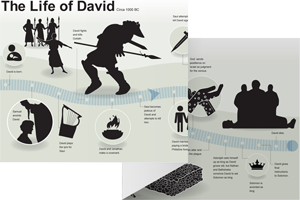2:1–7 Following the death of Saul, David asks Yahweh if he should go into the territory of Judah to begin consolidating his kingdom. Yahweh advises him to do so, and the people of Judah anoint David as their king. |
2:1 after this Refers to the events of 2 Sam 1.
inquired of Yahweh David probably seeks Yahweh’s counsel through Abiathar’s ephod (see 1 Sam 14:18 and note; 23:9–12; 30:7–8).
I go up David asks Yahweh whether he should begin his tenure as king.
To Hebron Hebron was a city of refuge in the territory of Judah (Josh 21:13) and part of the inheritance of Caleb (Josh 14:14; 15:13; Judg 1:20). In the time of the patriarchs, it was called Kiriath-arba (see Gen 23:2 and note).
was a city of refuge in the territory of Judah (Josh 21:13) and part of the inheritance of Caleb (Josh 14:14; 15:13; Judg 1:20). In the time of the patriarchs, it was called Kiriath-arba (see Gen 23:2 and note).
2:2 Ahinoam from Jezreel See 1 Sam 25:43 and note.
the wife of Nabal See 1 Sam 27:3 and note.
2:3 his men who were with him All the disenfranchised men who gravitated toward David. See 1 Sam 22:2; 23:13.
2:4 they anointed David there as king This anointing serves as a public confirmation of his kingship to the people of Judah. Compare 1 Sam 16:13.
The men of Jabesh-Gilead See 1 Sam 31:11–13.
2:7 let your hands be strong In a wise political move, David pronounces a blessing on Saul’s most ardent followers in hopes of gaining their support.
2:8–11 Abner, Saul’s cousin and the commander of his army (1 Sam 14:50–51), initially rejects David’s claim to kingship and installs Saul’s son, Ish-bosheth as king of Israel. |
2:8 Abner the son of Ner Saul’s cousin. Abner’s father Ner was Saul’s uncle, the brother of Saul’s father Kish (see 1 Sam 10:14; 14:50).
Ish-Bosheth One of Saul’s remaining sons—three of Saul’s sons were killed by the Philistines at the battle of Mount Gilboa (1 Sam 31:1–2; compare 2 Sam 21:5–9). It appears that Ish-bosheth was now the rightful heir to the throne, according to progeny based kingship. Abner is attempting to keep Saul’s dynasty intact.
Ish-bosheth is called Eshbaal in 1 Chronicles (see 1 Chr 8:33 and note; 9:39) and also may be the same person as the Ishvi mentioned in 1 Sam 14:49.
is called Eshbaal in 1 Chronicles (see 1 Chr 8:33 and note; 9:39) and also may be the same person as the Ishvi mentioned in 1 Sam 14:49.
to Mahanaim Located in the region east of the Jordan River where support for Saul’s dynasty appeared to be strongest.
2:10 he reigned two years Compare 1 Sam 13:1 and note.
2:11 seven years and six months Ish-bosheth’s two-year reign is included in this summary statement. David appears to have been the only ruler in Israel for a period of five years and six months; this period took place prior to his moving the capital city to Jerusalem (see 2 Sam 5:5–10).
2:12–32 The remainder of this chapter recounts a period of bitter war between the houses of Saul and David. Ultimately, the rivals call a temporary truce, and peace is restored in Israel. |
2:12 to Gibeon Located in Benjaminite territory, among those loyal to Saul’s dynasty (compare Josh 21:17; 1 Sam 9:1–2).
 Battles of Saul and David Table
Battles of Saul and David Table
2:13 Joab A son of Zeruiah, David’s sister (1 Chr 2:13–16). He was the head of David’s army (2 Sam 20:23; 1 Chr 27:34).
Joab and his two brothers—Abishai and Asahel |
2:14 fight in our presence They apparently call the young men to compete in representative combat, similar to the Goliath incident (see 1 Sam 17:4 and note).
2:16 so they fell together Simultaneous mortal wounds. All 24 men die in the contest.
Helkath Hazzurim The Hebrew phrase used here means “Field of the Sword Edges” or “Field of Blades.” The place name commemorates this unusual and tragic event.
2:18 Joab and Abishai and Asahel David’s nephews (sons of his sister Zeruiah) and brothers of Joab (1 Chr 2:13–16).
2:19 the right or to the left Asahel pursues Abner with singular focus.
2:21 seize for yourself one of the young men Abner encourages Asahel to fight someone else, apparently convinced that he is better prepared to win against another man.
2:22 could I show my face Abner does not want to be responsible for killing the brother of his rival general, Joab. He probably understands that reprisals will follow.
2:23 the butt of the spear Asahel is behind Abner, about to overtake him. Abner probably means to keep Asahel at a distance, not to kill him, since he uses the blunted end of the spear rather than the blade.
the spear went out of his back Attesting to the violence of the wound. This does not appear to be Abner’s original intention (2 Sam 2:22).
stood there The people are probably shocked at the death of their leader and surprised at the manner in which he dies.
2:24 Joab and Abishai They pursue him in order to exact revenge for their brother’s death; this is exactly what Abner was trying to avoid (see v. 22 and note).
2:28 they no longer pursued after Israel Abner and Joab agree to call a temporary end to their civil war.
2:31 among the men of Abner; three hundred and sixty Abner lost 18 times more men than David did.

|
About Faithlife Study BibleFaithlife Study Bible (FSB) is your guide to the ancient world of the Old and New Testaments, with study notes and articles that draw from a wide range of academic research. FSB helps you learn how to think about interpretation methods and issues so that you can gain a deeper understanding of the text. |
| Copyright |
Copyright 2012 Logos Bible Software. |
| Support Info | fsb |
 Loading…
Loading…


 Joab
Joab